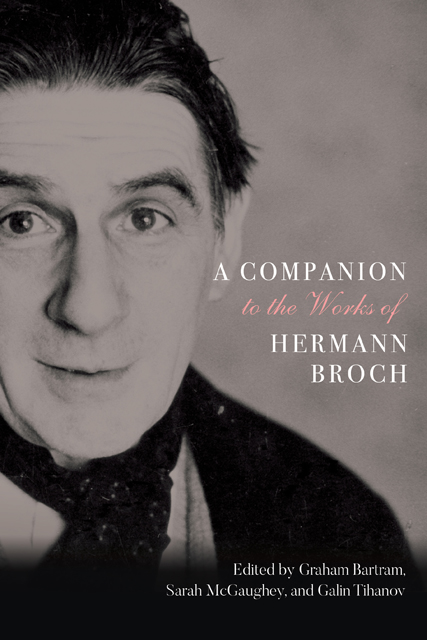Book contents
- Frontmatter
- Contents
- Preface
- Acknowledgments
- List of Abbreviations
- Introduction: Broch’s Life and Works
- 1 Perspectives on Broch’s Die Schlafwandler: Narratives of History and the Self
- 2 Hermann Broch and the Dilemma of Literature in the Modern Age
- 3 Interrogating Modernity: Hermann Broch’s Postromanticism
- 4 Broch and the Theater: Die Entsühnung and Aus der Luft gegriffen as Tragic and Comic Dramatizations of the Economic Machine
- 5 Limits of the Scientific: Broch’s Die Unbekannte Größe
- 6 Broch’s Die Verzauberung: Ludwig Klages and the Bourgeois Mitläufer
- 7 Hermann Broch’s Massenwahnprojekt and Its Relevance for Our Times
- 8 Human Rights and the Intellectual’s Ethical Duty: Broch’s Political Writings
- 9 Broch’s Der Tod des Vergil: Art and Power, Language and the Ineffable
- 10 From the “Tierkreis-Erzählungen” to Die Schuldlosen: The Creation of Broch’s Last Novel
- 11 Broch’s Legacy and Resonance
- Selected Bibliography
- Notes on the Contributors
- Index
10 - From the “Tierkreis-Erzählungen” to Die Schuldlosen: The Creation of Broch’s Last Novel
Published online by Cambridge University Press: 20 January 2023
- Frontmatter
- Contents
- Preface
- Acknowledgments
- List of Abbreviations
- Introduction: Broch’s Life and Works
- 1 Perspectives on Broch’s Die Schlafwandler: Narratives of History and the Self
- 2 Hermann Broch and the Dilemma of Literature in the Modern Age
- 3 Interrogating Modernity: Hermann Broch’s Postromanticism
- 4 Broch and the Theater: Die Entsühnung and Aus der Luft gegriffen as Tragic and Comic Dramatizations of the Economic Machine
- 5 Limits of the Scientific: Broch’s Die Unbekannte Größe
- 6 Broch’s Die Verzauberung: Ludwig Klages and the Bourgeois Mitläufer
- 7 Hermann Broch’s Massenwahnprojekt and Its Relevance for Our Times
- 8 Human Rights and the Intellectual’s Ethical Duty: Broch’s Political Writings
- 9 Broch’s Der Tod des Vergil: Art and Power, Language and the Ineffable
- 10 From the “Tierkreis-Erzählungen” to Die Schuldlosen: The Creation of Broch’s Last Novel
- 11 Broch’s Legacy and Resonance
- Selected Bibliography
- Notes on the Contributors
- Index
Summary
In early 1933 hermann broch found himself with a serious case of writer’s block. The last volume of Die Schlafwandler had been published a few months before, and while it was a succès d’estime, the sales figures fell short of expectations. The work on the “Filsmann-Roman,” initially planned as a possible fourth volume of Die Schlafwandler,was not going well, as Broch repeatedly complained to his friends. The political events in Germany had a paralyzing effect on him, the new novel was overburdened with philosophical and artistic problems, and his economic situation was dire. Meanwhile, Daniel Brody was urging him to produce a different kind of novel, a short and light text that could please a wider audience and therefore be more lucrative (BB, col. 448).
Writing “light” was, however, something with which Broch had always struggled. Despite the ease with which he wrote fiction, literature for Broch carried a number of heavy obligations. It was an instrument to provide answers to the questions that neopositivist philosophy was no longer willing or able to entertain; the poet thus bore political and social responsibility. Also, legitimate art had the obligation to be innovative, as new insight could only be gained through new form. Unfortunately, artistic innovation seldom went along with commercial viability, as the Schlafwandler trilogy had shown clearly, and to continue on the same experimental road that Die Schlafwandler had begun was not just far from producing light reading but would push him into the territory of his Irish alter ego, James Joyce (KW 13/1, 223).
Compounding these difficulties, in the disturbing political and economic situation of 1933, Broch’s chronic doubts about the validity of his life as a writer were becoming louder: “der ‘unpolitische, der weltabgewandte Dichter und Philosoph,’ ist das nicht das Böse schlechthin in dieser Zeit?” (BB, col. 492; the “unpolitical, the detached poet and philosopher,” is that not evil par excellence in this age?). Yet at the same time Broch, in his core a homo religiosus,felt equally acutely that the root of the current crisis was in the religious realm,and that it was literature, by its nonrational nature closely related to the religious sphere (KW 9/2, 53), that would be instrumental in creating a new religiosity.
- Type
- Chapter
- Information
- A Companion to the Works of Hermann Broch , pp. 207 - 227Publisher: Boydell & BrewerPrint publication year: 2019

